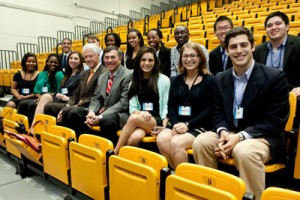By Christa Nianiatus
Reprinted from Cornell Chronicle, May 3, 2012

For her drive to make Ithaca a more accessible community for the elderly and the disabled, Jaime Freilich '13, a human development major in the College of Human Ecology, was named a campus representative for the Clinton Global Initiative University (CGIU).
Founded by former U.S. President Bill Clinton, CGIU seeks to connect college students to address social or environmental challenges with practical, innovative solutions. Campus representatives are expected to make a "Commitment to Action" to create goals and take steps to solve a local concern.
Freilich was one of the 14 Cornell campus representatives and commitment mentors (previous campus representatives who advise other students) who attended CGIU's annual conference March 30-April 1. They were among more than 1,000 college students who attended the conference to represent their Commitments to Action on international or domestic projects on education, environment and climate change, peace and human rights, poverty alleviation and public health.
Freilich has been actively fulfilling CGIU's service mission throughout the year.
"It's a support network, really," Freilich said. "The goal is to bring people together who are like-minded, in that they all are actively bringing about some change that they want to see in the world. [CGIU] provides mentorship, guidance and resources to help us with aspects of our commitment."
Freilich -- a member of Ithaca's Disability Advisory Council, which counsels Mayor Svante Myrick '09 on accessibility matters -- was selected for the honor because of her commitment to educating others on disability and elder issues and for improving her community with "new, measurable solutions." The council has advocated for the disabled and elderly and brought their concerns to city leaders. For instance, Freilich said, they have raised the issue that several public buildings in downtown Ithaca have heavy doors and lack automatic door controls, limiting access to these spaces. The council also reviews city development projects to ensure that accessibility concerns are taken into consideration.
Freilich first became interested in these issues after taking a course last year on disability and employment policy. "I've always known that I wanted to help people in some way," Freilich said. "The course is what ended up motivating me to get involved."
The following summer she began work as a research assistant at the ILR School's Employment and Disability Institute, where she became familiar with accessibility requirements of the Americans with Disabilities Act and the many overlooked issues faced by people with disabilities.
"That's why the education component was so important to me," Freilich said. "If you're making accessibility accommodations, it's very important that people understand that they are in existence and why they're in existence."
Freilich also volunteers as a Human Ecology Ambassador, advising prospective students about college life and the student experience.
Christa Nianiatus '13 is a student communications assistant for the College of Human Ecology

